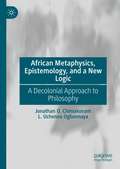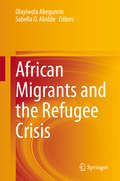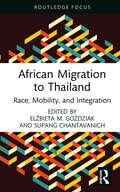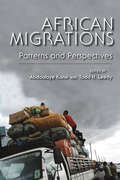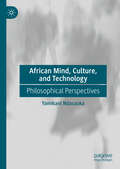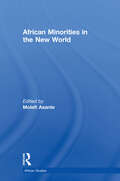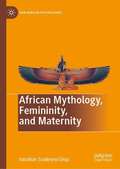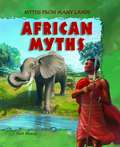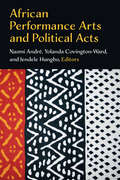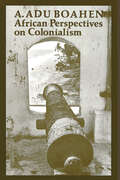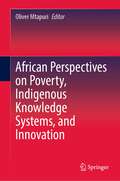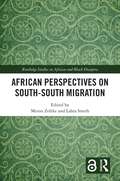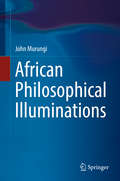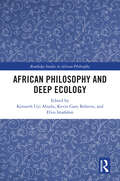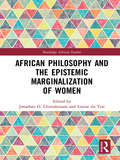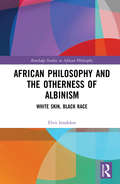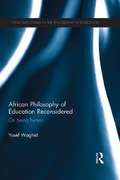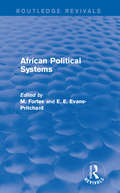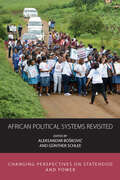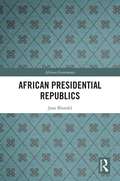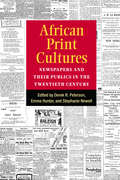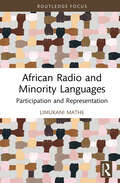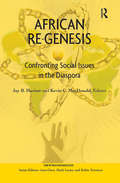- Table View
- List View
African Metaphysics, Epistemology and a New Logic: A Decolonial Approach to Philosophy
by Jonathan O. Chimakonam L. Uchenna OgbonnayaThis book focuses on African metaphysics and epistemology, and is an exercise in decoloniality. The authors describe their approach to "decoloniality" as an intellectual repudiation of coloniality, using the method of conversational thinking grounded in Ezumezu logic. Focusing specifically on both African metaphysics and African epistemology, the authors put forward theories formulated to stimulate fresh debates and extend the frontiers of learning in the field. They emphasize that this book is not a project in comparative philosophy, nor is it geared towards making Africa/ns the object/subjects of philosophy. Rather, the book highlights and discusses philosophical insights that have been produced from the African perspective, which the authors argue must be further developed in order to achieve decoloniality in the field of philosophy more broadly.
African Migrants and the Refugee Crisis
by Olayiwola Abegunrin Sabella O. AbiddeThis book discusses African migration and the refugee crisis. Economic, political and social tension in the Middle East and in many parts of the Global South has induced historic mass migration across national and international borders. The situation is especially dire in Africa, where a sizable number of Africans have chosen or have been forced to leave their countries of origin for Europe and North America. Written by an international team of scholars, this edited book traces the refugee crisis around the world, telling the necessary story of forced migration, intentional exclusion, and human insecurity from an Afrocentric lens. The volume is divided into three sections. Section I places African migration within the broader contexts of international history, law, economics, and policy. Section II discusses cases of African migration to Europe, Latin America, and the Mediterranean. Section III considers negative consequences of mass African migration, including the restriction and criminalization of migration, post-traumatic stress disorder, and gender-based violence. A compelling account of risk, resilience, and global power dynamics, this volume will be useful to students and researchers interested in African studies, migration, peace and conflict studies, and policy as well as professionals, practitioners, NGOs, IGOs, governmental and humanitarian organizations.
African Migration to Thailand: Race, Mobility, and Integration (Routledge Series on Asian Migration)
by Elżbieta M. Goździak and Supang ChantavanichThis book, based on exploratory ethnographic research, analyzes the experiences of African migrants in Thailand. Thailand has always been a regional migration hub with Africans being the most recent. Sitting at the intersection of race and migration studies, this book focuses on the challenges Black and labor migrants face trying to integrate into a society that has had very limited contact with and knowledge about Black Africans. Bringing together research from African, Thai, and European scholars, this volume focuses on forced migrants, such as Somali asylum seekers, and labor migrants, largely African men seeking better livelihoods in niche economies such as gem trading, garment wholesale, and football playing and coaching. The book also includes theoretical contributions to the understanding of precarity and human security, the concept of in/visibility to analyze the challenges African migrants face in Thailand as well as the concept of othering to understand discrimination against Africans. The book also analyzes the Thai migration policy context and the challenges facing Thai policy-makers, law enforcement representatives, and the migrants themselves. While not comparative in nature, this volume directly connects with studies of Africans in other parts of Asia, especially China. Addressing an important gap in migration research, this book will be of interest to researchers across the fields of migration and mobility studies, African Studies, and Asian Studies.
African Migrations: Patterns And Perspectives
by Todd H. Leedy Abdoulaye KaneSpurred by major changes in the world economy and in local ecology, the contemporary migration of Africans, both within the continent and to various destinations in Europe and North America, has seriously affected thousands of lives and livelihoods. The contributors to this volume, reflecting a variety of disciplinary perspectives, examine the causes and consequences of this new migration. The essays cover topics such as rural-urban migration into African cities, transnational migration, and the experience of immigrants abroad, as well as the issues surrounding migrant identity and how Africans re-create community and strive to maintain ethnic, gender, national, and religious ties to their former homes.
African Mind, Culture, and Technology: Philosophical Perspectives
by Yamikani NdasaukaThis book provides a philosophical investigation of technology in Africa, articulating conceptual foundations and analyses rooted in African worldviews and communitarian values. It aims to spur discourse and understanding of how technology can be justly shaped for human advancement in Africa. Yamikani Ndasauka highlights the need to understand African conceptions of existence, ethics, and values as foundations for envisioning more humanistic technological applications. A historical contextualisation traces the layered origins of African technology philosophy in indigenous innovation, resistant adaptation of external systems, and creative fusion of endogenous and exogenous knowledge. The book develops African frameworks to assess and design technology in accord with human dignity and collective advancement.
African Minorities in the New World (African Studies)
by Toyin Falola Niyi AfolabiThis book uncovers the reality that new African immigrants now represent a significant force in the configuration of American polity and identity especially in the last forty years. Despite their minority status, African immigrants are making their marks in various areas of human endeavor and accomplishments—from academic, to business, to even scientific inventions. The demographic shift is both welcome news as well as a matter for concern given the consequences of displacement and the paradoxes of exile in the new location. By its very connection to the ‘Old African Diaspora,’ the notion of a ‘New African Diaspora’ marks a clear indication of a historical progression reconnecting continental Africa with the New World without the stigma of slavery. Yet, the notion of trans-Atlantic slavery is never erased when the African diaspora is mentioned whether in the old or new world. Within this paradoxical dispensation, the new African diaspora must be conceived as the aftermath of a global migration crisis.
African Mythology (Mythology Around The World Ser.)
by Sandra GiddensAfrican mythology is as vast as the African continent itself. The myths of Africa vary from country to country and have been passed down orally through a strong communal tradition. Readers learn exactly what mythology is, why it is so important to cultures, and how the mythology ties in to Africa s history.
African Mythology, Femininity, and Maternity (Pan-African Psychologies)
by Ismahan Soukeyna DiopThis book explores feminine archetypes and mythological figures in African and European traditions with an underlying goal of describing the foundations of social status for women. The author provides a rich corpus of mythology and tales to illustrate aspects of female and mother-daughter relationships. Diop analyzes the symbolic aspects of maternity and femininity, describing the social meaning of the matrix, breasts, and breastfeeding. A retrospective of female characters in African literature brings an interesting approach to explore the figures of femininity and maternity in society. After an extensive analysis of African mythology and tales, the author proposes a way to integrate them in the clinical psychotherapy as a projective material. The analysis of clinical cases offers an example of how this material can be used in therapy with women from African descent.
African Myths (Myths From Many Lands)
by Neil Morris Graham KennedyReaders learn the mythological explanations of how the universe was created, the sun was stolen, and how a spider gained the world's collection of stories.
African Myths and Legends (World Books Myths and Legends)
by Philip ArdaghA collection of traditional tales from Africa, reflecting the cultures and religions from which the stories come.
African Performance Arts and Political Acts (African Perspectives)
by Yolanda Covington-Ward Naomi Andre Jendele HungboAfrican Performance Arts and Political Actspresents innovative formulations for how African performance and the arts shape the narratives of cultural history and politics. This collection, edited by Naomi André, Yolanda Covington-Ward, and Jendele Hungbo, engages with a breadth of African countries and art forms, bringing together speech, hip hop, religious healing and gesture, theater and social justice, opera, radio announcements, protest songs, and migrant workers’ dances. The spaces include village communities, city landscapes, prisons, urban hostels, Township theaters, opera houses, and broadcasts through the airwaves on television and radio as well as in cyberspace. Essays focus on case studies from Cameroon, the Democratic Republic of the Congo, Nigeria, Senegal, South Africa, and Tanzania.
African Perspectives on Colonialism (The Johns Hopkins Symposia in Comparative History #15)
by A. Adu BoahenThis history deals with the twenty-year period between 1880 and 1900, when virtually all of Africa was seized and occupied by the Imperial Powers of Europe. Eurocentric points of view have dominated the study of this era, but in this book, one of Africa's leading historians reinterprets the colonial experiences from the perspective of the colonized. The Johns Hopkins Symposia in Comparative History are occasional volumes sponsored by the Department of History at the Johns Hopkins University and the Johns Hopkins University Press comprising original essays by leading scholars in the United States and other countries. Each volume considers, from a comparative perspective, an important topic of current historical interest. The present volume is the fifteenth. Its preparation has been assisted by the James S. Schouler Lecture Fund.
African Perspectives on Poverty, Indigenous Knowledge Systems, and Innovation
by Oliver MtapuriThis book examines the connections between poverty and innovation in Africa. Through case studies and theorizations from a distinctly African perspective, it stands in contrast to current theoretical works in the field, which remain very much rooted in Western-orientated thinking. The book investigates the application of methodologies which explain numerous African contexts in connection with issues of poverty and inequality. It reflects on comparative practices and praxes on the African continent, including commonplace traditions and practices in alleviating poverty, taken against a background of the failure of current prescriptions for poverty alleviation, such as the Structural Adjustment Programmes (SAPs) and the Poverty Reduction Strategy Papers (PRSP). There is a dire need for new practical perspectives which move Africa forward using its indigenous knowledge. Owing to a general lack of recorded African theories and methodologies on poverty, inequality and innovation, this book represents a pioneering corpus of African knowledge addressing poverty and inequality through local innovations. Adopting a transdisciplinary approach, it is relevant to students and scholars in development studies and economics, African studies, social studies, political history and political economy, climate studies, anthropology and geography.
African Perspectives on South–South Migration (Routledge Studies on African and Black Diaspora)
by Lahra SmithThis book investigates the diverse and dynamic forms of migration within Africa. It will be crucial reading for researchers, students, and policy makers with a focus on South-South Migration, Migration and Inequalities, Migration and Development, and Refugee and Humanitarian Studies.
African Philosophical Illuminations
by John MurungiThe illumination of African philosophy offered in this volume leads to the illumination of philosophy in general. Illuminating arises as an essential task of philosophy, whether African or not. What is illuminated is not already there, but is constituted at the moment of illumination. This book invites the reader to participate in the illuminating work of philosophy and necessarily, thereby, to contribute to his or her own self-constituting self-illumination. Although the focus is on African philosophy, the book also bridges the gap between African philosophy and other branches. Today more than ever, a bridging philosophy is called for, and this book helps to meet that need. This book poses philosophical questions such as who is an African and what Africa is, and seeks philosophical answers. In doing so, it contributes to the ongoing discourse on African philosophy. It addresses such issues as the African grounding of philosophy, the difference between African and Black philosophy, the African body, African art as expressed in and by Chiwara, the plight of African trees as the plight of Africans, and the symbolic meaning of Robben Island.
African Philosophy and Deep Ecology (Routledge Studies in African Philosophy)
by Kenneth Uyi Abudu, Kevin Gary Behrens, and Elvis ImafidonThis book investigates African philosophical contributions to the concept of deep ecology, which advocates for rethinking human and non-human relationships within our ecosystems, by promoting the inherent and earned worth of all beings.With ecological crises impacting lives around the world, this book interrogates deep ecology thinking from African philosophical perspectives, highlighting the continent’s important ontological, epistemological, ethical, aesthetic, and broad philosophical contributions. The book investigates issues such as the eco-phenomenology of human / non-human animals’ relations, Ubuntu and the environment, the superiorist fallacy, environmental belongingness, the impact of colonization and modernity on non-human trauma, the politics of ecological narrative about African places, the question of moral status, African socialist perspectives, the question of degrowth, selective subordination, biodiversity loss, land ethics, the ontology of waste, and the concept of personhood in relation to global climate and ecological justice.Providing a significant intervention in our understanding of the ecological crises and our duties toward ecosystems and the non-human other in the twenty-first century, this book is an important read for researchers, advocates and other stakeholders working in the fields of environmental philosophy, climate change, indigenous studies, and African Studies.
African Philosophy and the Epistemic Marginalization of Women (Routledge African Studies)
by Jonathan O. Chimakonam Louise Du ToitThis book examines the underexplored notion of epistemic marginalization of women in the African intellectual place. Women's issues are still very much neglected by governments, corporate bodies and academics in sub-Saharan Africa. The entrenched traditional world-views which privilege men over women make it difficult for the modern day challenges posed by the neglect of the feminine epistemic perspective, to become obvious. Contributors address these issues from both theoretical and practical perspectives, demonstrating what philosophy could do to ameliorate the epistemic marginalization of women, as well as ways in which African philosphy exacerbates this marginalization. Philosophy is supposed to teach us how to lead the good life in all its ramifications; why is it failing in this duty in Africa where the issue of women’s epistemic vision is concerned? The chapters raise feminist agitations to a new level; beginning from the regular campaigns for various women’s rights and reaching a climax in an epistemic struggle in which the knowledge-controlling power to create, acquire, evaluate, regulate and disseminate is proposed as the last frontier of feminism.
African Philosophy and the Otherness of Albinism: White Skin, Black Race (Routledge Studies in African Philosophy)
by Elvis ImafidonAlbinism is one of the foremost disability and public health issues in Africa today. It often makes headlines in local, national and international medias and forms the basis for intense advocacy at all levels. This is primarily due to the harmful representations of persons with albinism deeply entrenched in African traditions. These deeply rooted ideologies about albinism in African thought have largely promoted the continuous discrimination, stigmatization, harming, killing, commodification and violation of the human rights of persons with albinism in African places. How has albinism emerged as a thick concept in African traditions? What are these deeply entrenched ideas about the ontology of albinism in African thought? What epistemic injustice has been done to persons with albinism in Africa places? Why do harmful beliefs about albinism still persist in modern African societies? How does the African communalistic ethic justify the harm done against persons with albinism? What is the duty to, and burden of, care for persons with albinism? What peculiar existential challenges do persons with albinism in general and females with albinism in particular face in African societies and how can they be overcome? What can be learnt from the education philosophy of reconstructionism and genetic engineering in improving the wellbeing of persons with albinism? African Philosophy and the Otherness of Albinism: White Skin, Black Race digs deep into these philosophical questions revealing fascinating but latent aspects of how albinism is understood in African places as a necessary step to take in improving the wellbeing and integrity of persons with albinism in Africa today. This book will be of interest to scholars and students of African philosophy, sociology, African studies and disability studies.
African Philosophy of Education Reconsidered: On being human (New Directions In The Philosophy Of Education Ser.)
by Yusef WaghidMuch of the literature on the African philosophy of education juxtaposes two philosophical strands as mutually exclusive entities; traditional ethnophilosophy on the one hand, and �scientific� African philosophy on the other. While traditional ethnophilosophy is associated with the cultural artefacts, narratives, folklore and music of Africa�s peop
African Political Systems (Routledge Revivals)
by M. Fortes E. E. Evans-PritchardFirst published in 1940 and this edition in 1987, this book is a comparative study of African political institutions. It describes different types of social organisation that are found in a number of African societies and analyses the principles underlying these traditional forms of government. The volume represents the results of field studies carried out by trained investigators in a number of areas, and was compiled and edited under the auspices of the International African Institute. It will be of interest to students, anthropologists and administrators.
African Political Systems Revisited: Changing Perspectives on Statehood and Power (Integration and Conflict Studies #26)
by Aleksandar Bošković Günther SchleeReexamining a classical work of social anthropology, African Political Systems (1940), edited by Fortes and Evans-Pritchard, this book looks at the colonial and academic context from which the work arose, as well as its reception and its subject matter, and looks at how the work can help with analysis of current politics in Africa. This book critically reflects upon the history of anthropology. It also contributes to a political anthropology which is aware of its antecedents, self-reflexive as a discipline, conscious of pitfalls and biases, and able to locate itself in its academic, social and political environment.
African Presidential Republics (African Governance)
by Jean BlondelThis book provides a systematic assessment of the behaviour of some relatively successful presidents in African presidential republics, examining the part played by presidents in the development of their countries. Using two groups of case studies, African Presidential Republics examines the variations between presidential republics within Africa since decolonisation. Jean Blondel divides the ten countries studied into those in which presidents had always been elected regularly, namely Botswana, Mozambique, Namibia, Senegal and Tanzania, and those in which there was irregularity in the appointment of presidents, namely Benin, Uganda, Ghana, Liberia and Nigeria. The case studies analyse the manner in which presidential republics have manifested themselves in Africa, exploring the argument that the presidential republic is one of the key institutional arrangements likely to lead societies towards development. African Presidential Republics will be of interest to students and scholars of African politics, comparative politics and political leadership.
African Print Cultures: Newspapers and Their Publics in the Twentieth Century
by Emma Hunter Derek Peterson Steph NewellThe essays collected in African Print Cultures claim African newspapers as subjects of historical and literary study. Newspapers were not only vehicles for anticolonial nationalism. They were also incubators of literary experimentation and networks by which new solidarities came into being. By focusing on the creative work that African editors and contributors did, this volume brings an infrastructure of African public culture into view. The first of four thematic sections, "African Newspaper Networks," considers the work that newspaper editors did to relate events within their locality to happenings in far-off places. This work of correlation and juxtaposition made it possible for distant people to see themselves as fellow travellers. "Experiments with Genre" explores how newspapers nurtured the development of new literary genres, such as poetry, realist fiction, photoplays, and travel writing in African languages and in English. "Newspapers and Their Publics" looks at the ways in which African newspapers fostered the creation of new kinds of communities and served as networks for public interaction, political and otherwise. The final section, "Afterlives, " is about the longue durée of history that newspapers helped to structure, and how, throughout the twentieth century, print allowed contributors to view their writing as material meant for posterity.
African Radio and Minority Languages: Participation and Representation (Routledge African Media, Culture and Communication Studies)
by Limukani MatheWithin Africa, radio provides an important platform for accommodating diverse linguistic groups and enabling speakers to express themselves in their own local languages. This book investigates how radio broadcasting across the continent provides a platform for cultural participation and the representation of minority language speakers in a contested public sphere. In African media, a fierce contest wages for representation and participation, in which majority languages often emerge at the exclusion of minority ethnolinguistic groups. This book considers the important role that radio can play in broadcasting in minority languages. Drawing on in-depth original analysis, ethnographic observation and interviews with minority language radio hosts and guests from across South Africa, Zimbabwe, Nigeria, Malawi, Namibia, Mozambique, Lesotho and Kenya, this book considers to what extent African radio is accommodative of minority languages and what the challenges and prospects are for this. Ultimately, the book argues that radio’s three-tier system of broadcasting through analogue and digital radio leaves the medium of radio particularly well placed to provide equal access for ethnolinguistic groups in Africa.This ambitious and broad-ranging study will be an essential read for scholars and students of media studies and sociolinguistics in Africa.
African Re-Genesis: Confronting Social Issues in the Diaspora (One World Archaeology Ser. #48)
by Jay B. Haviser Kevin C. MacDonaldRipped from motherland and family, ethnically mixed to quell the potential of uprisings, and brutalized by regimes of hard labor, the heart - the spirit - of Africa did not stop beating in the New World. Rather, it survived and has re-emerged; changed by contacts with new cultures and environments, but still part of the continuum of African tradition: an African Re-Genesis. This is the first volume in its field to emphasize the interdisciplinary temporal and geographic comparative research of Archaeology, Anthropology, History and Linguistics to allow us to form unique perspectives on broader trends in the transformation and (re-) emergence of African Diaspora cultures. African Re-Genesis confirms that regardless of discipline, from continental Africa to Europe, the Western Hemisphere and Indian Ocean, all Diaspora research requires a relevance to modern communities and sensitivity to the interplay with contemporary cultural identities. Matters concerning race and cultural diversity, though ostensibly de-fused by the vocabulary of political correctness, remain contentious. Indeed, the topic of racial relations has become to the twenty-first century what sex was to the nineteenth century - something best not discussed in public, and better talked around than confronted directly. African Re-Genesis strikes at the nerve of urgency that the past, present and future globalization of African cultures, is a cornerstone of the entire human experience, and it thus deserves recognition as such.
